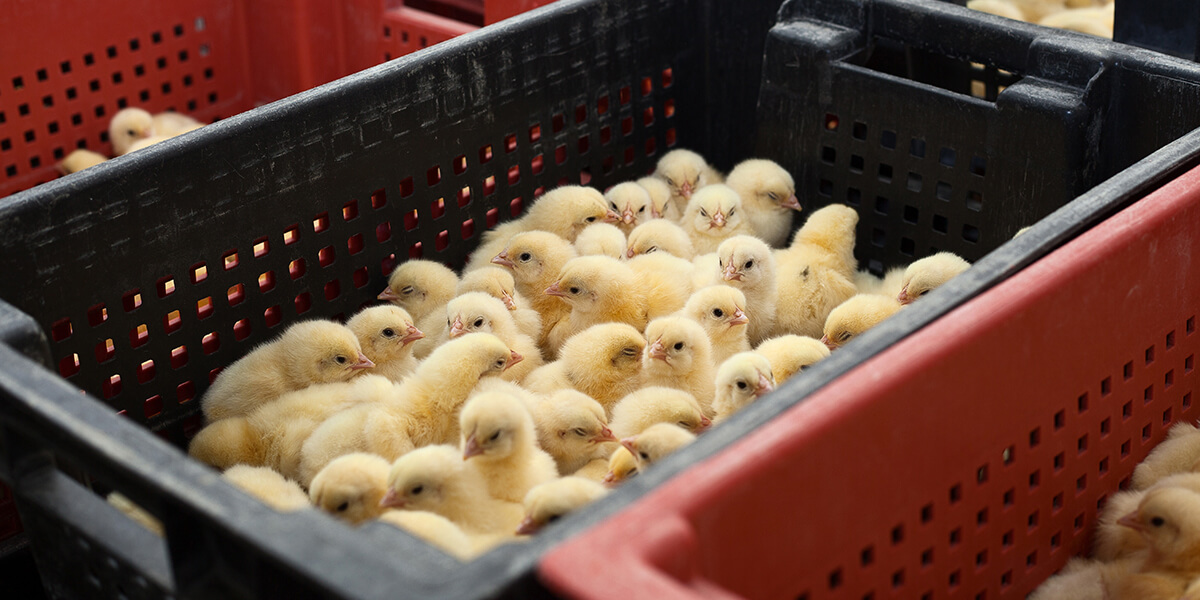In the life of a broiler chicken, the eggshell is its first means of protection. One of the most important functions of an eggshell is preventing the penetration of harmful bacteria to avoid contamination of the embryo inside. For this reason, a broiler breeder must produce an egg with a strong shell and uniform cuticle deposition.
With proper management practices and the addition of performance trace minerals, poultry producers can improve eggshell quality and increase the hatchability, quality and survivability of their chicks.
The Importance of Eggshell Quality
When an egg is passed through the cloaca of a broiler breeder, it’s an easy opportunity for contamination, especially if the breeder has been dealing with digestive disorders like diarrhea caused by harmful bacteria or disease. A thick eggshell will help prevent those bacteria from infecting the embryo. The cuticle is secreted while the egg is being laid and seals the pores of the eggshell to help prevent the entrance of bacteria into the egg.
After an egg is laid, it may take 3 up to 15 days before it is put in the incubator. As the egg is moved to a lower temperature, it’s important to avoid excessive moisture loss in those eggs due to heat and gas exchange. With an eggshell that is too thin, embryos can experience dehydration and an increased mortality rate.
Additionally, good eggshell quality is critical for the transfer of nutrients and minerals from the eggshell to the yolk of the egg. This will help improve bone development for the embryo.
Factors That Cause Poor Eggshell Quality
In addition to poor nutrition, factors such as disease challenges and environmental stress – like heat stress – can lead to poor eggshell quality and reduced hatchability. During heat stress, water intake typically increases, which causes nutrients to pass through the gut quicker with less time for absorption. As a result, there will be fewer nutrients available to be utilized for producing high-quality eggs.
Genetics can also play a role in eggshell quality. Certain genetic lines may simply produce thicker eggshells than others. Another important factor is age. An older breeder will produce larger eggs with thinner shells.
Five Tips for Improving Eggshell Quality and Chick Survivability
- Implement a vaccination program to keep breeders protected against virus challenges that could ultimately affect eggshell quality or infect embryos.
- Ensure good bone quality in broiler breeders. Birds rely on their bones to deposit minerals like calcium, phosphorus and others onto the eggshell.
- Provide adequate amounts of clean, high-quality water to avoid dehydration and avoid health risks. Hard water, for example, can interact with some minerals in the diet and cause them to be unavailable for absorption.
- Avoid any stressors. If a bird is experiencing any stress, like heat stress, they won’t have enough minerals or other nutrients available to transfer to the eggshell and embryo, which can increase embryo mortality.
- Provide adequate amounts of high-quality feed with Zinpro Performance Minerals® for broiler breeders to absorb and transfer to the eggshell and embryo.
Performance Trace Minerals Improve Eggshell Quality and Hatchability
Peer-reviewed trace mineral research shows a number of benefits to eggshell quality and hatchability. Zinc and manganese are critical for eggshell formation while copper improves structural strength and elasticity of connective tissue, like the eggshell membrane, while also increasing bone strength.
Studies show that feeding zinc from Availa® Zn to broiler breeders in combination with zinc sulfate reduces the percentage of cracked eggs by 1.4% and increases the percentage of eggs hatched by 1.8% compared to the feeding of zinc sulfate alone.

Broiler breeders fed zinc, manganese and copper from Availa® ZMC produced eggs that had eggshells 2.3% heavier and 1% thicker compared to eggs from birds fed sulfates alone.

Performance trace minerals also improve the hatchability of fertile eggs. Feeding iso levels of Availa-ZMC increased the hatchability of fertile eggs by 3.4% compared to birds fed sulfates.

Eggshell quality is important for the early protection, development and survivability of embryos. A diet well-fortified with performance trace minerals can improve eggshell quality and hatchability, helping to produce higher-quality chicks.
To learn more about including Zinpro Performance Minerals in your poultry nutrition and feeding program, contact your Zinpro representative today.

